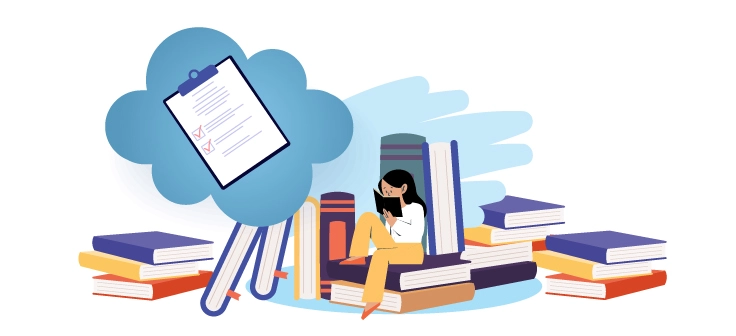
IELTS Reading is often considered more challenging than any other section of the test. It tests your ability to read and understand English texts on academic, social or occupational topics. It is the second part of the test, immediately after the Listening section. Through various questions from three passages, the reading section evaluates your understanding of the English language.
Read Also: IELTS Exam Basic Facts
The IELTS reading section is one of the most critical sections in IELTS. You need to answer 40 questions within 60 minutes. Therefore, it is crucial to answer all parts of the question and avoid making mistakes as much as possible to achieve an IELTS Reading Band 8.
It is crucial to prepare exquisitely for the reading section. While IELTS training, the difficulty you will face is understanding much text within a short period. With an adequate amount of practice, tips, and understanding of avoidable mistakes, you can obtain a good score for the IELTS reading section. We have gathered some essential information, reading strategies and mistakes to avoid to help achieve your goal.
Read More: IELTS Exam Dates 2023
IELTS Reading is graded based on candidates' ability to demonstrate their understanding of what they read. It includes three sections with a time limit of 60 minutes. To improve your scores in the reading section, follow the tips and reading techniques given below:
It is one of the most effective ways to improve your English, and it helps you get used to the IELTS Reading style and develop your reading skills. IELTS readings tasks are designed to examine how well people can read a passage, analyse its meaning and answer questions from the perspective they have gained while reading - not just by rote memorisation or understanding word definitions.
Expose yourself to various reading materials like books, newspapers, magazines, journals, educational materials, social media posts, blogs, and many more. Doing so will widen your vocabulary and improve your reading speed, providing an edge while taking the test.
Read Also: IELTS Preparation Tips
Skimming and Scanning are two ways to complete IELTS Reading passages quickly. Skimming is the process of reading a text for main ideas, while Scanning helps you take in specific information from the passage. Skimming does not mean you try to understand the passage. Instead, it means you grab the sense of the topic and layout.
With these techniques, you can read a passage in 2 or 3 minutes, not longer. You can also underline keywords as you see them, which makes it easier to find relevant answers. Scanning helps you locate information quickly. Hence, understanding the innate meaning of the passage is not recommended.
Unlike the listening section, you can try reading the questions first before reading the passage. The questions are directly related to the passage, so reading the questions first will help you locate the correct answers as you go.
Instead of reading the passage first, read the questions carefully and highlight the keywords, names, dates, location or anything related to the questions as you skim through the paragraph, section by section. Compare the formations to the questions and check their compatibility. If you are not able to find the answer, pace your reading.
Preparing for IELTS reading is a great way to improve your Vocabulary. Read texts with which you may not be familiar and try to understand what they're about, teaching yourself more along the way.
If you have trouble understanding specific passages in an IELTS test document because of unfamiliar Vocabulary, look up those words using a dictionary or any online source. It will ensure that you do not waste time puzzling over a word whose meaning can make sense after checking it out outside of context.
Read Also: IELTS Test Pattern 2023
IELTS reading is a timed exam. With a duration of 60 minutes, you can allocate 20 minutes to each passage. By splitting your time evenly for three passages, you have a better chance for success and will not be short on time.
It is essential to manage your time well, so make sure you know how long it takes you to complete different texts. Through developing skimming and scanning techniques, you can increase your reading speed which will help you manage your time efficiently.
Read Also: Avoid these 5 Mistakes in IELTS Speaking Test
IELTS reading items are usually quite varied in terms of Vocabulary and grammar. It means that you need to recognise the meaning from language clues and understand what is being said when it is unfamiliar or not used frequently.
If an item contains synonyms or paraphrasing, this will help you identify different meanings for the same word, either rule out possible answers or lead you towards one answer choice. Again, having an extensive vocabulary will help understand the context referred to through idioms and synonyms.
Avoid spelling errors at all costs. Spelling mistakes will likely lead to lower scores on IELTS Reading because it’s easy for an examiner to spot them while reading a passage.
If you are prone to misspell words, make sure you practice with a dictionary and spell-check now and then. Only practising can help you avoid spelling mistakes. So, practice thoroughly before attempting the IELTS exam.
Read Also: Problems with the IELTS Writing section & Solutions?
Mistakes are prone to happen but, with practice, they can be easily noticed and avoided. You can effortlessly Score A 7+ Band Score for your IELTS by Following these Tips and Tricks. Even so, many IELTS test-takers lose markers to prevalent mistakes. Here are some common IELTS Reading mistakes to avoid:
Read Also: IELTS Speaking Tips
IELTS exam is a proficiency exam that validates your English language. To Take The IELTS Test, you must understand how each section works and what you must work on to obtain a good score. A few other tips to keep in mind to get a good score for your IELTS reading test include:
Read Also: IELTS Band Scores: How are they calculated?
To Sum Up
Studying for the IELTS reading test can be intimidating and challenging, but it doesn’t have to be. We hope these points help you better prepare and ace the reading section of your IELTS exam with ease. To get a good score in the IELTS reading test, make sure to answer all questions, read all passages accurately, and read the heading of the passage and questions to grab the gist of the passage better and locate answers easier. In addition, avoid common mistakes that we have mentioned, and remember to practise the reading strategies. This way, you can improve your reading test scores as well as the overall IELTS band score.
Read Also: My IELTS exam is tomorrow, what should I do?

English Language and Soft Skills Trainer
Ms. Shereen Backer is a broad minded English language and Soft Skills trainer with Edoxi Training Institute, Dubai. She is fascinated about training young minds and professionals to reach new heights in their career. Her vast experience as an English language and soft skills trainer enables her to handle training sessions for students from diverse cultures.
Ms. Shereen challenges her students to be the best version of themselves. She holds strong records of accomplishment with TESOL/TEFL Certification and IDP Teacher’s Training Program Accreditation.
For the last seven years, she has been working with companies and universities as an ESL/EFL verbal trainer cum academic and career counsellor. She helped more than 500 individuals to clear exams like IELTS, PTE, TOEFL, OET, DET, PSAT, NMSQT and SAT. She also specialises in voice and accent training for English language students.
